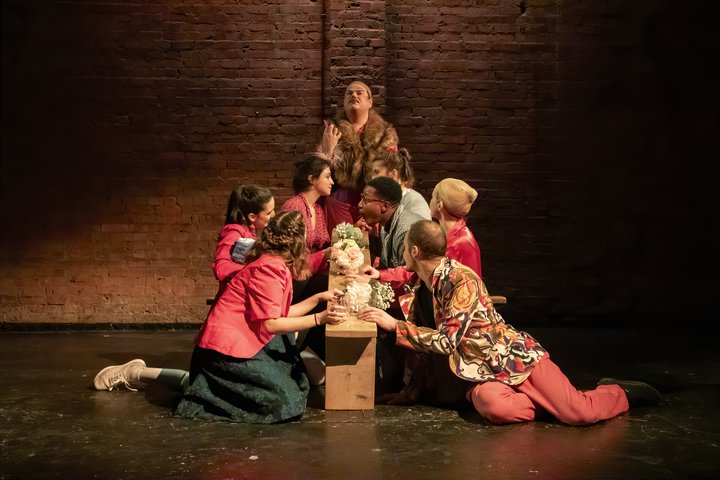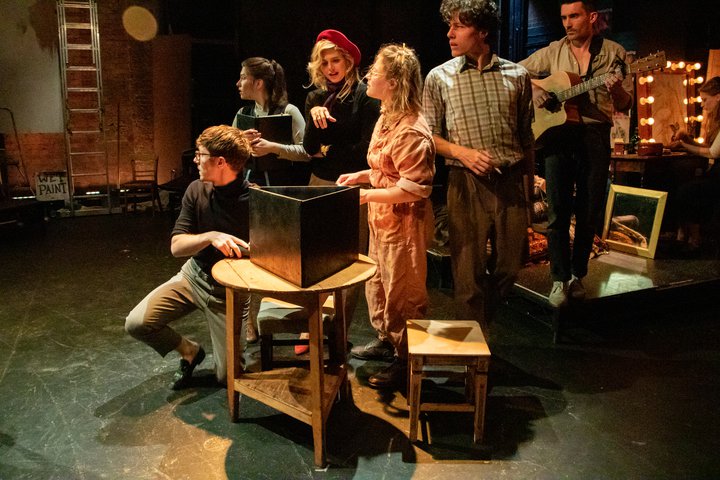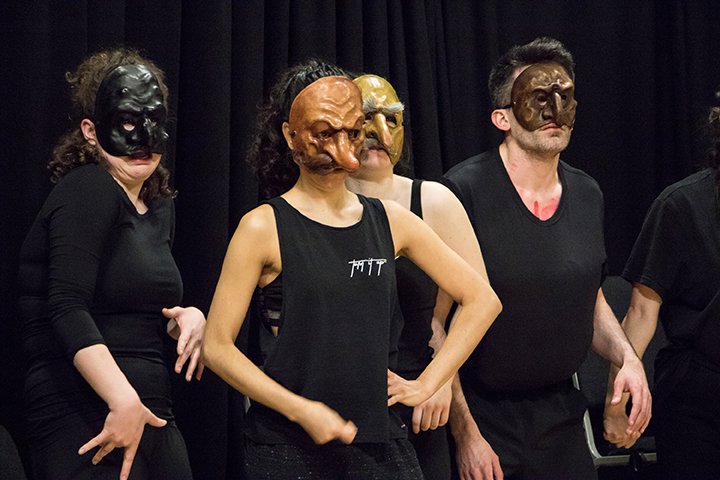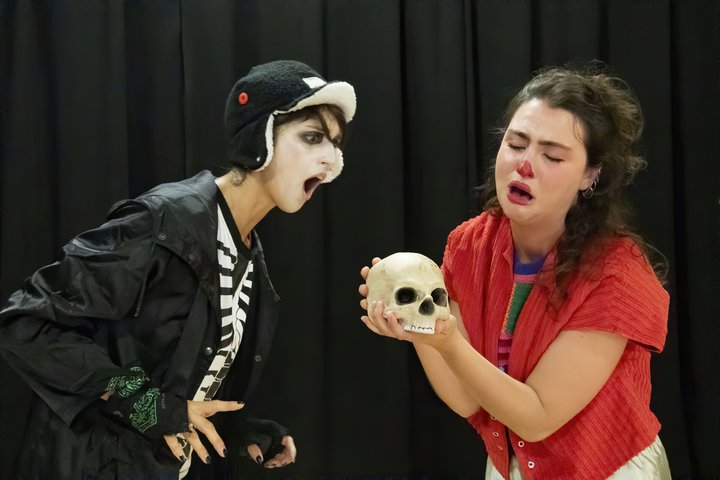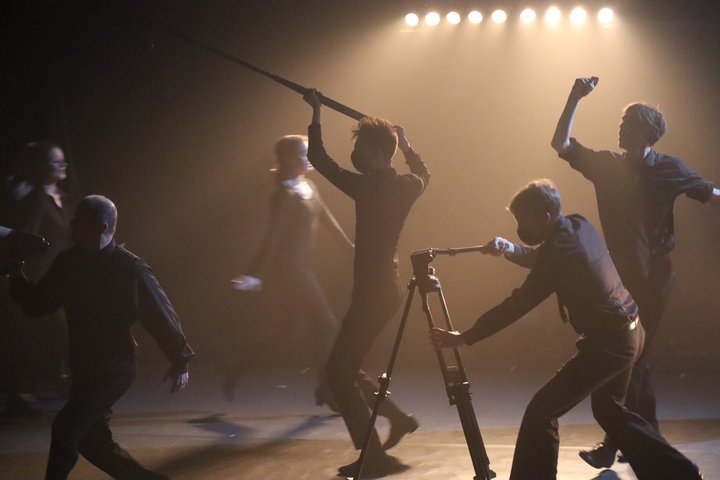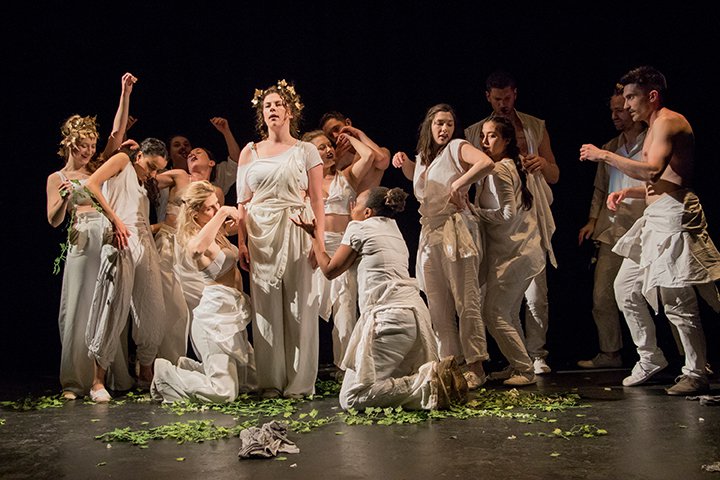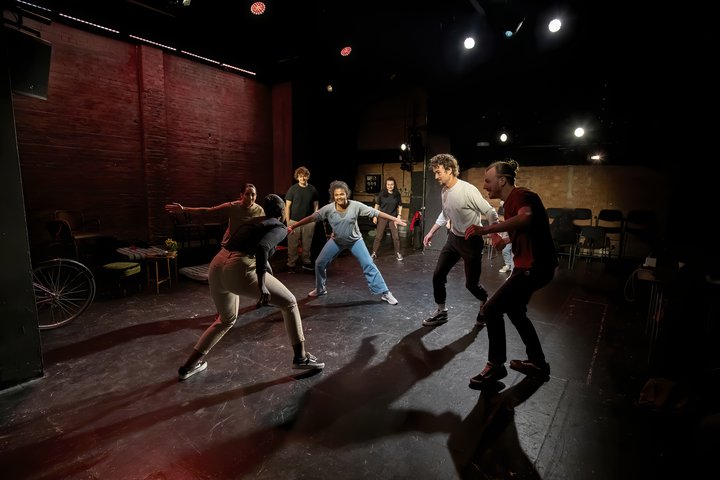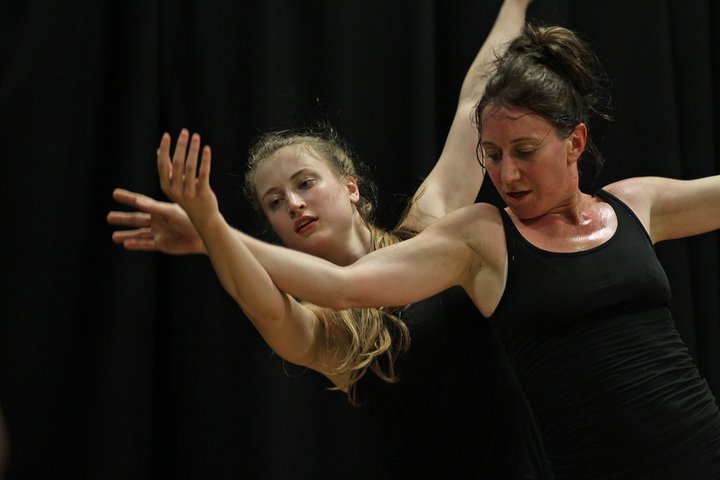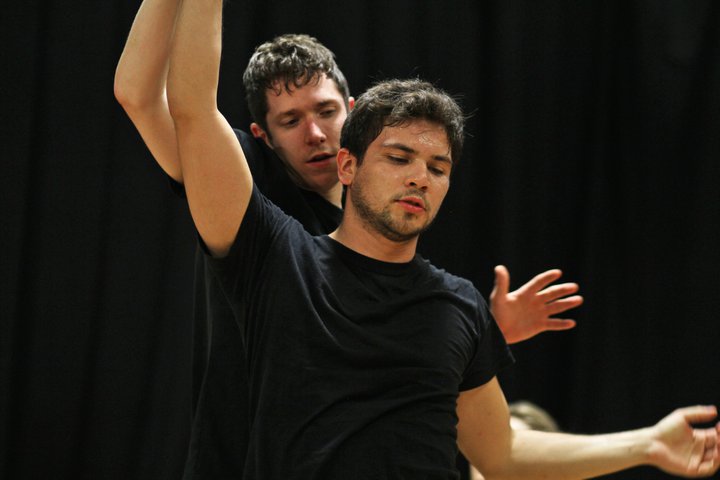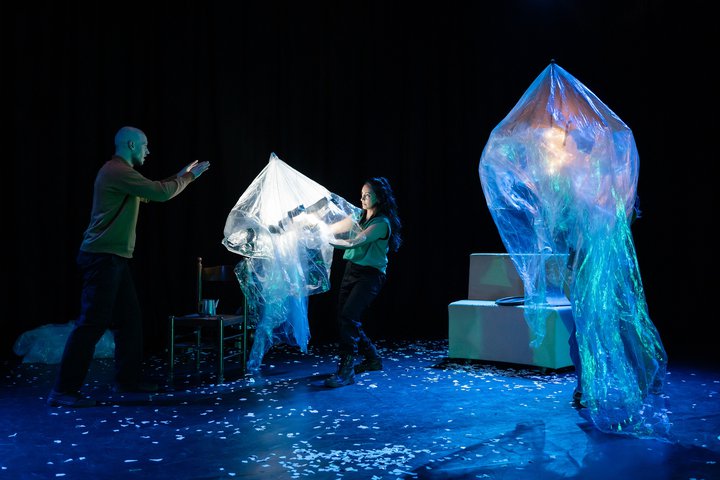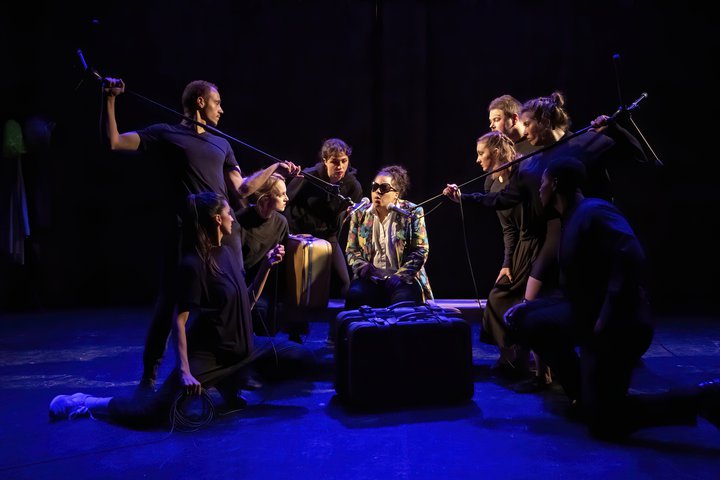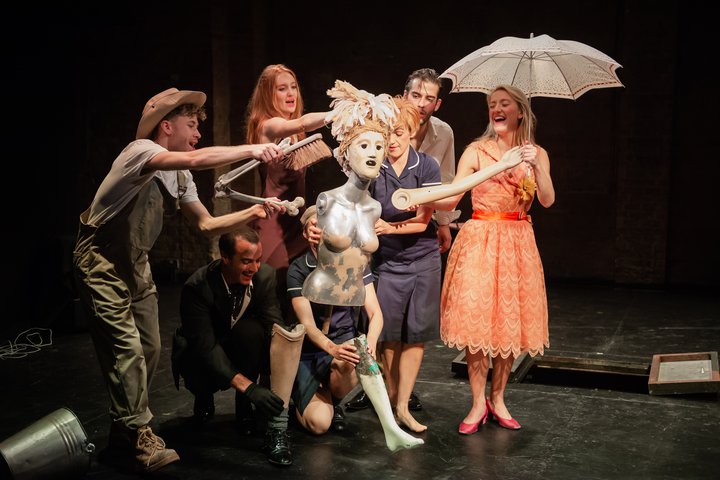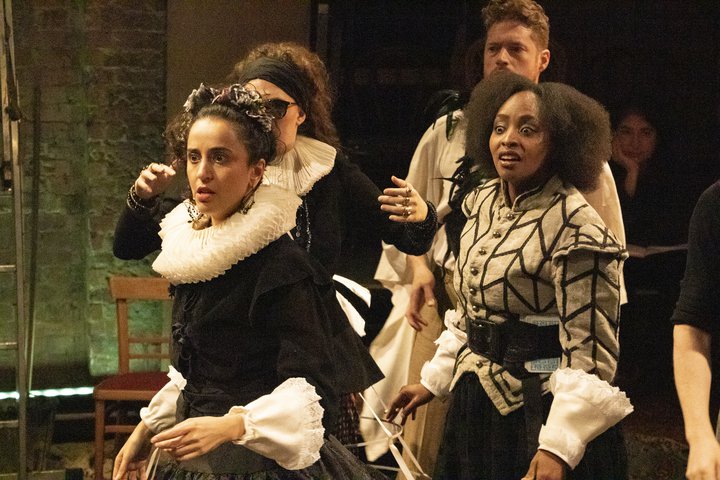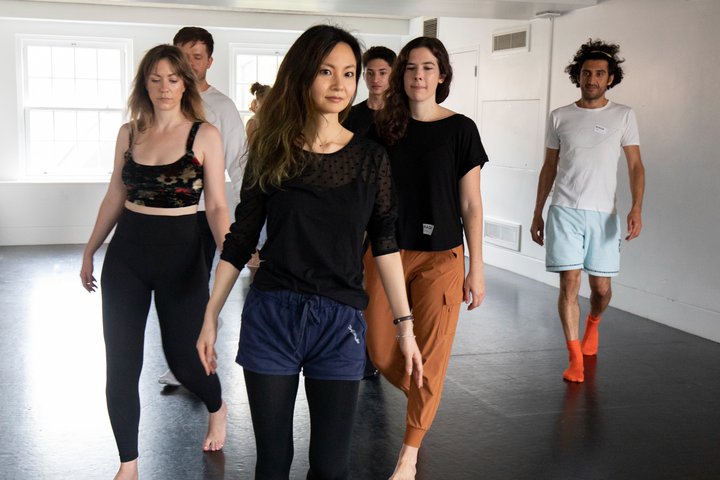MA Theatre Lab
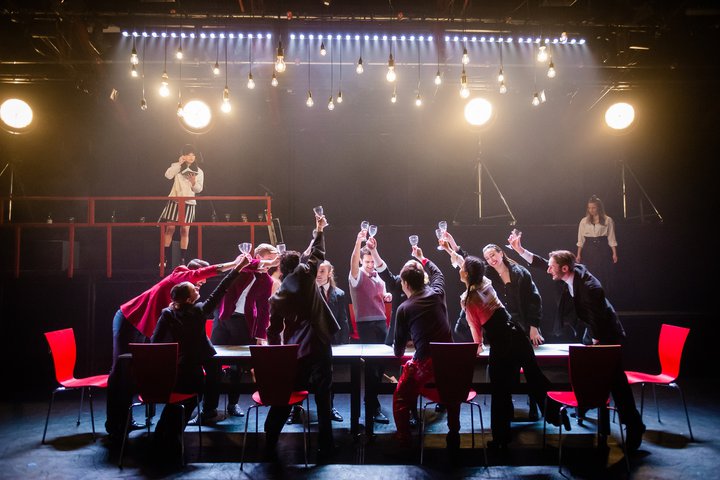
We empower performers and actors to boldly and imaginatively approach theatre-making, push artistic boundaries and thrive as contemporary artists.
Our world-leading training enables you to take creative risks, devise new and original theatre and performance, and develop your sense of purpose as a creative leader and change-maker.
Through a combination of studio-based classes and projects, professional development, and public performances, our training will support you to become a versatile, playful, and resilient performer and theatre-maker.
Working in a supportive and equitable environment with creative collaboration at its heart, you will explore improvisation and experimentation to deepen your craft as a theatre and performance maker and innovate through reflective research practice.
At RADA, you’ll be empowered to play a revitalising role in the theatre-making landscape and consider the role of theatre-makers and performers in cultural leadership within a continuously evolving industry.
This programme aims to nurture the student’s ability to make new work in many forms, through experimenting with existing approaches in the studio and creating original performance in collaboration with experienced professionals and in self-led work. Extending training, it will re-address the work of the performer and actor as an embodied form at the heart of the theatre-making process. The course explores improvisation and collaboration, alongside research and reflection as core approaches to learning.
Course structure
This course is taught in four terms over 12 months from September to September.
This course is built around four compulsory strands led by course leader Ian Morgan and a team of professional practitioners. Find out more about Ian here.
- Methodology and creative practice
- Contextual studies and theatre history
- Voice and movement
- Public performance lab
What will I learn?
- Explore a range of approaches to the practice and creation of contemporary theatre and performance.
- Cultivate your skills as a performer and the ability to work both autonomously and collaboratively as a theatre maker.
- Confidently and critically evaluate and use academic and practice-based research in your work.
- Explore cultural, social, critical and artistic contexts when devising new work.
- Develop the practice and performance skills necessary to take original ideas from conception to production.
- Build a repertoire of techniques to prepare for a career of changing professional, technical and artistic expectations.
- Expand your creative practice, interrogate your craft and become a creative leader.
Methodology and creative practice
The first two terms centre around rigorous studio-based work in Performing Lab 1 and 2. Learning and assessment will focus on a practical exploration of techniques in performance and acting, interpretation and devising. This learning will be reinforced by research and reflection. Supported by expert practitioners, you will apply, both collectively and individually, embodied approaches to different texts and other source material for performance.
You will explore techniques including Stanislavski's ‘late career’ experimentation on an actor-centred approach to text work, practices associated to Epic theatre, clowning, physical theatre and other ensemble performance approaches from around the world. Through this work you will develop your own creative practice.
Across terms one, two and four the Development of Performance sessions will offer you a specific space for collective and individual experimentation, applying your emerging skills to devising from scratch and supported by a constructive, work-centred approach to feedback.
Contextual studies and theatre history
In terms one and two, contextual studies explores the link between historical context and practice, examining developments in theatre internationally through a wide range of examples. Through practical engagement with plays and styles ranging from South East Asian performance traditions to Ancient Greek drama, to the theatre and performance movements of the 20th and 21st Century, you will explore how theatre grew in relation to social and political contexts.
Voice and movement
Throughout the year you will develop through an integrated training approach to body and voice. Vocal performance will follow an embodied ethos, introducing you to some alternative approaches. You will also explore song, through ensemble polyphony and individual singing. Physical work will progress in an ensemble approach, whilst challenging the individual to develop through predominantly a ‘via negativa’ based approach.
Public performance lab and Development of Performance festival
In terms three and four you will engage in intensive theatre making/devising processes. These will test your abilities as a collaborative, creative artist and theatre-maker, offering the opportunity to apply the skills you have developed and putting into practice the ethos of your training. In your third term, you will work as an ensemble alongside a professional practitioner to create a full-length original piece of work for public performance. In term four, over the summer, you will work towards making small-scale, original performances as a part of the Development of Performance module (either in companies or as solo makers) for an end of year Lab Works Festival in September. This process will be supervised and mentored by members of staff and people from the industry. Throughout the year there will also be further opportunities to share your work and receive extensive feedback from staff and visiting professionals.
For more detailed information on course content, assessment and outcomes, download our Programme Specification.
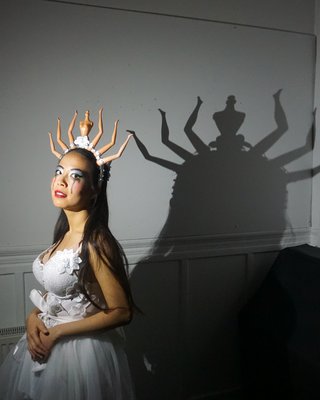
Timetable and workload
Term one, two and three are 12 weeks long. In terms one, two, and half of term three, attendance from Wednesday afternoon to Saturday evening is compulsory, for an intensive 28 – 32 hours.
Whilst lab is designed to allow some time for external work, it is necessary for you to set aside time for preparation such as line-learning, reading of recommended supporting material, rehearsal with your fellow students and the upkeep of your notes. Space will be available on a Tuesday evening and before lesson time on a Wednesday. Note that as a student at RADA you will be able to book space for rehearsal on a daily basis, if available, alongside the space provided in your schedule.
The Lab working day in terms one, two, and half of term three is from 1.30pm-9.30pm on a weekday, and from 9am - 5.30pm on a Saturday.
The second half of term three, over June and part of July, involves work Monday-Saturday. Normally you'll work 10am-6pm daily over a six-week full-time block of supervised devising work, leading to a public production at RADA. This is followed by a further two weeks of independent work on the final reflective essay.
Over the fourth term in the summer, you will work either alone or in small groups over 6 weeks devising your own performance for our Lab Works Festival in the second week of September – at the beginning of the next academic year. This project could be, in special circumstances, performed outside of RADA, but will need to be documented for assessment purposes.
There may be additional seminars offered to you outside of class hours and optional extracurricular activities, commitment to which will add to the workload.
Furthermore, you will have timetabled meetings at least twice a term with the course leader and receive regular feedback from other members of the faculty.
Between spring and summer terms, students will have a one-week intensive work session as a part of the Developing Performance module. This may involve preparing work for possible festival visits over the year.
You can find our term dates here.
Assessment
The MA Theatre Lab leads to an unclassified masters degree; this means you will receive a pass or fail.
Assessment is based on both practical (process and studio sharing) and critical/reflective written work. You will be assessed by various methods throughout your training, which includes continuous, synoptic, summative and formative assessment methods.
The course consists of 180 credits.
- Movement/physical and voice (20 credits)
continuous assessment over all four terms. - Contextual studies and theatre history (20 credits)
in-class continual assessment over two terms and end term 2 written assignment - Performing Lab 1 (20 credits)
term 1 presentation and reflective written essay. - Performing Lab 2 (20 credits)
term 2 presentations - Dissertation/public performance (40 credits)
term 3 practical production and written dissertation - Performing Lab 3 (20 credits)
term 4 presentation and reflective written essay - Developing Performance (40 credits)
terms 1, 2 and 4 continual assessment and performance
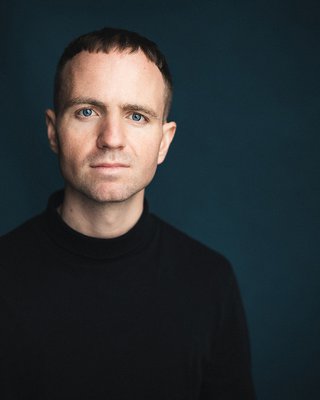
Complete the online application form at the top of this page. If you need more information, you can read our guide to the application form. Late applications will not be considered under any circumstances.
We encourage applications from people of any age, gender, disability, ethnicity, marital status, nationality, sexual orientation, parental status, socio economic status, religion or belief. We are committed to promoting equality and diversity, to pursuing non-discriminatory policies and practice, and eliminating unfair discrimination.
Entry Requirements
Applicants must meet the following criteria:
Academic Criteria
Applicants should normally have a first degree in English, Drama, Theatre, Performance Studies, or another related humanities subject. However, those with professional performing experience or appropriate prior learning (such as significant experience in the field) will also be considered.
Non-Academic Criteria
Applicants should have a strong interest in performance and related activities:
- Essential: Applicants must have at least three years of acting or performance experience, whether at university, amateur, or professional level. All types of performance will be considered relevant. For example, not only theatre and devised performance, but also dance, circus, live art, immersive work, etc.
- Highly desirable: Professional experience as an actor or performer. To reiterate, Applicants from other fields of study may be considered if they have sufficient practical experience in theatre and performance. In some cases, RADA may also consider Applicants with exceptional experience in performance and theatre who do not hold an undergraduate degree or equivalent Level 6 qualifications. This is assessed on a case-by-case basis.
Admissions Process
The information below explains each stage of the process; you can read more details about the process, what to prepare, and how we support disabled applicants in our admissions procedure guide.
Application Form
The application form will ask for:
- Your CV which should demonstrate your degree level qualifications and appropriate professional or work experience; show your engagement in theatre and acting/performance; and establish your credentials as someone who can take creative initiative.
- An 800-word personal statement. This should demonstrate your understanding of the course and share your experience in the field. It should also reflect on your thoughts concerning the potential role for theatre and performance in society and give some attention to envisaging the work you'd like to be involved with in the future.
- A reference from someone who knows your work
Application deadline
Your application must be completed and submitted by 19 March 2025 at 11.59pm (UK time).
Information for disabled applicants
We welcome applications from disabled applicants and encourage them to disclose relevant information regarding any disability when completing their application form, to enable us to provide additional support during the admissions process.
Find out more about the ways RADA support disabled applicants in our Student Life pages.
If you are a disabled applicant and would like further advice or guidance, please contact the admissions team directly on admissions@rada.ac.uk.
Auditions
Once you submit your application, the Admissions Team will then contact to either, depending on your preference:
- Provide a save-the-date for your in-person audition or
- Give you a self-tape submission deadline for your digital audition or
- Inform you that your application was unsuccessful.
After Application Submission
If you are selected for an audition, we will invite you to participate in an in-person audition (read the in-person guidance here) at RADA, or to submit a self-tape audition video (read the self-tape task guidance here). We give equal weighting to in-person and self-tape auditions; there is no advantage or disadvantage to auditioning by either method, but please be aware that spaces for the in-person auditions are limited so will operate on a first come, first served basis.
The in-person audition will take place at RADA and will comprise:
- a short, written task which will be emailed to you in advance of your audition.
- a practical workshop (three to four hours) during which you'll participate in exercises, share your audition speeches and explore creative collaboration. You will have the chance to reflect on the workshop and ask any questions with the Course Leader at the end of the workshop.
The self-taped audition video will comprise:
- Your audition speeches and a personal statement.
- A piece of physical performance.
- A creative piece of your own making, possibly responding to one of the given stimuli, which shouldn’t be extracts from existing filmed performances but instead, pieces specifically made for this submission.
Post-Audition Process
Following your in-person or digital (self-tape) audition, the Admissions Team will then contact you within up to six weeks to either:
- Provide a save-the-date for your online interview or
- Inform you that your audition was unsuccessful
Interview Process
Interviews will be online and the Admissions Team will be in touch to schedule your slot as soon as possible.
More information
- Final Decision: The decision of the Panel is final. If you are unhappy with the process, you may submit a complaint under our Admissions, Appeals & Complaints process.
- Application Limits: Applicants may only apply once per academic year.
- Transfer to other Programmes: It is not possible to transfer to other programmes at RADA. You should apply only for programmes you wish to complete. You can view our academic policies and procedures here.
How to apply
- Complete the online application form at the top of this page.
- The admissions team will then contact you to either confirm an audition date or inform you if you were unsuccessful (please note that this could take up to six weeks).
- If your application is successful you will be invited to an audition date.
If you need more information, you can read our guide to the application form.
There is an application fee of £49. This covers the cost of processing and progressing each individual application. Application fees are not refundable.
English is not my first language. How is fluency in English Assessed?
English Language Requirements For students who do not have English as their first language, you must provide proof that you can read, write, speak and understand English to a high level on the Common European Framework of Reference for Languages (CEFR) scale. For the MA Theatre Lab, you must have CEFR level C1 or IELTS 7.0 overall with a minimum of 6.5 in all areas. It will speed up your application if you are able to upload evidence of this at the time of applying.
Find out more about our English Language requirements here.
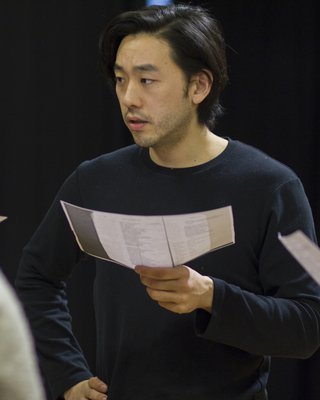
Tuition fees
MA Theatre Lab fees for entry in September 2025 will be:
Home (UK) students
£17,532
International
£25,000
See below for more information on whether you are classed as a Home (UK) or International student. This also affects the financial support available.
Please see the fees policy for more information about how RADA calculates tuition fee increases for each year of a course.
Find out more about funding your training.
UK or International student?
There are strict regulations regarding residency, which must be met in order to qualify for Home (UK) student status. Any EU student (except Irish nationals, which qualify for Home (UK) student status) starting a course from September 2021 onwards will have International student status, unless you have pre-settled status or settled status.
If you are unsure which category you fall into, please read this guide from the UK Council for International Student Affairs.
Home (UK) student
In order to be classed as a Home (UK) student you normally need to meet all of the following criteria on the first day of the first academic year of the course:
- you are settled in the UK (this means there is no immigration restriction on the length of your stay) and meet the residency requirement
- you are ordinarily resident in the UK, and have been for the full three years before the first day of the academic year (ordinarily resident means that your main home is in the UK, and you are choosing to live in the UK)
- the main reason for you being in the UK was not to receive full-time education.
International student
If you do not fall under the Home (UK) fee definitions, then you will be classed as an International student.
International students coming to RADA on a full-time course of more than six months will require a Student Visa before coming to the UK to start your course. Without the visa you will not be allowed to enter the UK. Please visit the UK Visas & Immigration website for further details.
The definitions on this page are only a very brief summary and there are several exceptions to the conditions listed. For more detailed information, please refer to the UK Council for International Student Affairs guide.
Other costs
Almost all materials you require for your course, including travel for any trips, will be included in your course costs.
Approximate costs for other materials: £300
The things not covered include practice clothes, yoga mats and footwear, play texts and stationery.
Please note: in some cases students may purchase elements of costume and props for their own work that will not be automatically refunded by RADA. In general, students should try and work with what is available to them.
International students will need to pay for visa costs. Please visit the UK Visas & Immigration website for further details.
Funding your training
It is important that you understand when you accept a place at RADA that you know how you will pay for it. We do not take account of financial need when offering places, but we do reasonably assume that if you are applying to come to RADA, you will be able to pay the fees and support yourself.
It is in your interest to provide us with information about how you intend to pay for your fees and support yourself through training.
Applying for a postgraduate Master's loan
If you are from the UK, you may be eligible to apply for a postgraduate Master's loan. This loan is not based on income and can provide a maximum of up to £12,167. It is paid directly to the applicant and can be used to pay tuition fees or living costs. If you intend to use the loan to pay for tuition fees, please note that the maximum amount does not cover the full cost of the course. You will be expected to cover the balance.
Visit www.gov.uk for more information.
Scholarships
RADA is not currently able to offer scholarships for the MA Theatre Lab. If this situation changes, we will update information on the website.
Support for international students
For students defined as International, you are required to pay the full cost of your fees and living expenses.
Your offer is made on the basis that you can meet these expenses from your own funds. There are also financial requirements associated with the allocation of a Student visa. Please visit the UK Visas & Immigration website for further details.
RADA courses are not eligible for US Federal Loans.
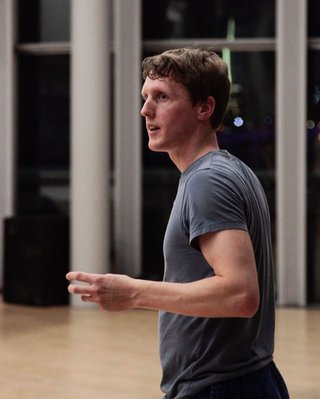
Where do MA Theatre Lab Graduates work?
The MA Theatre Lab develops participants for an independent, collaborative theatre and performance-making pathway. However, your work as an actor will be enhanced, through our extended and explorative approach to training and creativity. As Masters level students, graduates may also wish to apply their learning to developing a career in pedagogy and/or academia.
Graduates of the MA Theatre Lab work internationally in a range of theatre venues and companies, as well as in film and television, with many founding their own companies and creating new work.
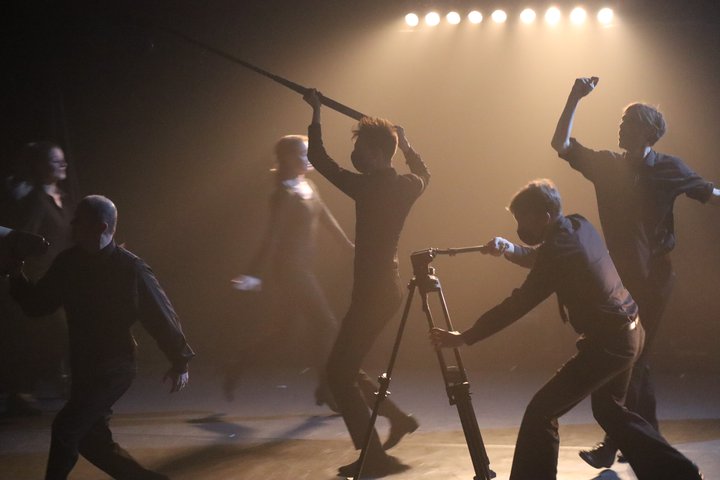

There is no upper age restriction. The course is very physically demanding and applicants are considered for audition based on their application.
We no longer produce a physical prospectus. All the information you need about our full-time courses can be found on our website, including course content, costs and funding, graduate destinations, the application process, welfare support and where to live.
All in-person auditions for the MA Theatre Lab take place at RADA in London. However, you can also submit a self-tape film for your audition - please see the How to Apply section above.
RADA accepts 18 students onto the MA Theatre Lab course each year.
We review all applications prior to selection for audition, which can take some time. As soon as your application has been processed, you will be notified whether or not you have been selected to audition.
Please note the admissions office can get incredibly busy at peak times while we process applications and schedule auditions. We’ll try to get back to you as promptly as possible. If you haven’t heard from us after one month of sending your application, please contact admissions@rada.ac.uk so we can confirm whether we have received your application, or update you on whether you are being invited to audition.
The application fee is required of all applicants, regardless of whether or not you are invited to audition.
The application fee is used to cover the cost of processing and reviewing your application and is not refundable under any circumstances.
If you are issued an in-person audition date that you cannot attend, please contact admissions@rada.ac.uk as soon as possible. Due to the high numbers of applicants, we have a very limited capacity to reschedule auditions.
If you are ill on the day, please email admissions@rada.ac.uk in advance of your audition. We will try to provide an alternative date, but this may not be possible and is dependent on where we are in the audition cycle.
Deferrals may be given in exceptional circumstances, but we recommend that you apply for a place in the year before the January you wish to begin your training.
There are different fees for UK and international students. You must have lived in the UK for three consecutive years prior to starting the course in order to qualify for Home (UK) level tuition fees. If, for example, you were born in the UK but then moved to Australia for twenty years, you would be liable to pay the international rate. Please see the UKCISA website for more information on Home and overseas fees.
Please read the information under 'Tuition fees' above to know if you are a UK or international student.
RADA courses are not eligible for US Federal Loans.
You can find our term dates up to summer 2025 here.
We do not accept student transfers into our higher education courses. For our acting and performance courses students are auditioned for places (including through several rounds of audition for the BA (Hons) in Acting). The courses are structured in a way that means it is not possible for someone to join part way through.
You can download our policy statement on transferring courses here.
We are planning to hold an open day for the MA Theatre Lab once applications are open. Please check the 'What's On' section of the website for dates.
Read our regulations and policies relating to admissions and current students here.

